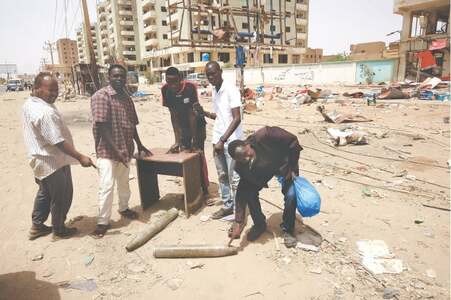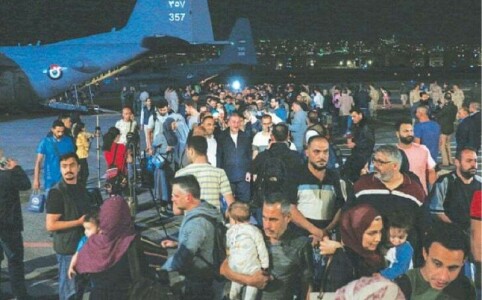The first two batches of total 260 Pakistanis evacuated from Sudan — where fighting between the army and paramilitaries has killed and wounded hundreds — arrived in Karachi on Friday, the Foreign Office (FO) said.
The first batch, comprising 149 individuals, arrived in the port city today morning, with the FO saying that the safe evacuation of every Pakistani and bringing them home was a “top priority”.
In a tweet, Foreign Minister Bilawal Bhutto-Zardari welcomed the first batch and vowed to continue work “until every Pakistani in Sudan is evacuated and brought home safe at the earliest”.
Hours later, the FO said a second batch of 111 stranded Pakistan had also reached Karachi.
“With the latest flight, 260 Pakistanis have returned home safely,” it added.
The stranded Pakistanis were evacuated from Sudan through Jeddah via a Pakistan Air Force (PAF) Airbus and C-130 Hercules aircraft.
On the directives of the prime minister, Air Chief Marshal Zaheer Ahmed Baber Sidhu had ordered the PAF transport fleet to carry out the swift evacuation of Pakistanis from conflict-hit Sudan.
After safely arriving in Pakistan, the evacuated families expressed their gratitude to the government and appreciated the Pakistan Air Force for their timely rescue amidst the rapidly deteriorating situation in Sudan.
A PAF spokesperson told Dawn.com that Pakistan Air Force would continue to repatriate their brothers and sisters in distress to their homeland.
Later, the FO another batch of 216 Pakistanis had reached Jeddah from Port Sudan aboard Weishanhu, a vessel of the Chinese Navy.
“We are grateful to our Chinese friends for this gesture of support and friendship,” the FO added.
Fighting broke out in Sudan on April 15 between forces loyal to army chief Abdel Fattah al-Burhan and his deputy-turned-rival Mohamed Hamdan Daglo, who commands the powerful paramilitary Rapid Support Forces (RSF).
At least 512 people have been killed and 4,193 wounded in the fighting, according to health ministry figures, although the real death toll is likely much higher.
Evacuation plan
Following the arrival of the first batch of Pakistanis from Sudan, FO spokesperson Mumtaz Zahra Baloch said during a press briefing that two more flights carrying around 200 Pakistanis were expected to arrive later in the day.
“One of them originated from Port Sudan and the other from Jeddah to bring back Pakistanis who had earlier been evacuated there,” she stated, highlighting that the evacuation was made possible because of the “robust inter-agency process led by the Ministry of Foreign Affairs”.
Detailing the government’s evacuation plan, Baloch said that 800 Pakistanis were transported from Khartoum to Port Sudan — which is relatively safe than other parts of the country — in the first phase.
The second phase of the evacuation operation consisted of transporting Pakistani nationals from Port Sudan to Jeddah, Saudi Arabia, or directly to Pakistan.
“Today’s flights, operating from Port Sudan via Jeddah, mark the first part of this second phase,” the FO spokesperson said, adding that additional flights were also planned.
Meanwhile, she continued, evacuation from Port Sudan to Jeddah continued via ferries operated by the Saudi government. Some passengers would also be transferred onboard a Chinese ship from Port Sudan to Jeddah.
“We remain engaged with friendly countries in the region and are especially grateful to the Kingdom of Saudi Arabia for facilitating this process by providing transport by ferry from Port Sudan to Jeddah and also hosting Pakistani nationals until their repatriation to Pakistan,” Baloch said.
She added that the Consulate General Jeddah would continue to coordinate with Saudi authorities and extend assistance to Pakistanis during transit through Jeddah.
Truce extended
In the final hours of a repeatedly broken three-day ceasefire, due to end at midnight, the army and the Rapid Support Forces (RSF) announced a 72-hour extension following pressure from Saudi Arabia and the United States.
There have been multiple truce efforts since fighting broke out between Sudan’s army led by General Abdel Fattah al-Burhan and the paramilitary RSF commanded by his deputy-turned-rival, Mohamed Hamdan Daglo. All have failed.
US Secretary of State Antony Blinken said the ceasefire had been “imperfect”, but “nonetheless has reduced violence”.
“I hear intense shelling outside my home,” a Khartoum resident told AFP on Thursday evening, asking not to be named.
On Thursday, warplanes patrolled over the capital’s northern suburbs as fighters on the ground exchanged artillery and heavy machinegun fire, witnesses said.
Hospitals have been shelled and more than two-thirds are out of service, the doctors’ union said Thursday, reporting at least eight civilians killed in Khartoum alone on Wednesday.
The World Food Programme has said the violence could plunge millions more into hunger in a country where 15 million people — one-third of the population — need aid.
Abdou Dieng, UN aid chief in Sudan, speaking from Port Sudan on Thursday, said he was “extremely worried about the situation”, with food supplies a huge concern.
Fighting has also flared in the provinces, particularly in the war-torn western region of Darfur.
Witnesses said clashes raged for a second day in the West Darfur capital El Geneina, with pro-democracy medics reporting a doctor shot dead.
“We are locked up at home and too afraid to go out, so we can’t assess the scale of the damage,” said a resident, who asked to remain anonymous for safety reasons.
The UN humanitarian agency said the fighting in West Darfur had disrupted food to “an estimated 50,000 acutely malnourished children”.
The violence has trapped many civilians in their homes, where they have endured severe food, water and electricity shortages.
Those who can afford to have taken the long and risky journey to flee the country.
Egypt said Thursday that at least 14,000 Sudanese refugees had crossed the border since the fighting erupted, as well as 2,000 people from 50 other countries.
“End the war”, 50-year-old refugee Ashraf told the warring generals after entering Egypt. “This is your own conflict, not that of the Sudanese people.”
At least 20,000 people have escaped into Chad, 4,000 into South Sudan, 3,500 into Ethiopia and 3,000 into the Central African Republic, according to the UN, which has warned if fighting continues as many as 270,000 people could flee.
Foreign governments have scrambled to get thousands of their citizens out, and UK Foreign Secretary James Cleverly urged Britons to leave while they can, saying evacuations could not be guaranteed after the end of a ceasefire.
The latest Saudi evacuation ship docked in the Red Sea port of Jeddah on Thursday to take the total evacuated by Riyadh to 2,744, only 119 of them Saudis, the foreign ministry said.
















































Dear visitor, the comments section is undergoing an overhaul and will return soon.